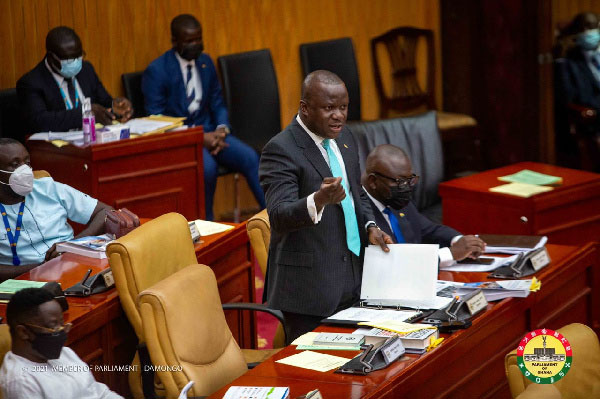Samuel Abu Jinapor
Members of the Minority caucus were awkwardly forced to listen to arguments by the Minister of Lands and Forestry, Samuel Abu Jinapor, for the 2022 budget to be approved after he slammed the record of economic management of the National Democratic Congress (NDC) during a debate in Parliament.
The powerful submission of the minister rattled the opposition lawmakers, who were taken to task on the performance of the Ghanaian economy under their watch, with Samuel Nartey George, NDC MP for Ningo-Prampram, rising to say: “Rt. Hon. Speaker, Hon. John Abdulai Jinapor (referring to a brother of the presenter who is also MP on the other side) is on point of order on claims made by Samuel Abdulai Jinapor. I wanted to draw your attention to it.”
First Deputy Speaker, Joseph Osei-Wusu, who was in the Chair, retorted: “Hon. Sam George, next time if you do that the House will be thrown out. The man is sitting right next to you. If you have a point of order let’s know that,” he said teasingly, throwing the House into spontaneous laughter.
Not Holding Back
Abu Jinapor, who is NPP MP for Damongo in the Savannah Region, did not hold back in his condemnation of the NDC’s poor handling of the economy, and said the worst performance of NPP under President Akufo-Addo is better than NDC administration under the watch of ex-President John Dramani Mahama.
“Mr. Speaker, there have been a lot of debates in this House and propaganda, but let me put before the House one statistics from the Ghana Statistical Service. In 2014, GDP growth was 2.9%, the 2015 stood at 2.1% and the 2016 stood at 3.4% which is their best.”
“Mr. Speaker, in spite of all difficulties our national economy has undergone; in spite of the destruction in the global supply chain; in spite of the fact that even developed industrialised countries are struggling, today in 2021 the GDP growth stands at 3.5%.”
“In 2014, 2015 and 2016 there were no crises or pandemics and yet the best GDP growth our opponent scored is less than our worst performance. Our worst is their best. That is the data. I don’t pretend to be an economist, I don’t pretend to be a financial expert, but these are the facts,” he fired.
Poor Show
He continued, “The best GDP growth by the John Mahama administration was in 2016. It stood at 3.4%. These are Bank of Ghana figures. No one has contested them and it is uncontestable. Even in COVID-19, we are doing far better than them when they did not have a crisis on their hands,” he stressed amidst cheers from the Majority side.
“Without a crisis on their hands, they managed the economy and took us to the IMF and we had a freeze on public recruitment. Without a pandemic, they took us into an unemployment situation which caused the National Graduates Unemployment Association.
“Without a pandemic, our friend from the other side plunged this country into four years of dumsor. Under their watch and that is their record,” the minister hammered further.
Fiscal Deficit
Abu Jinapor said the Akufo-Addo administration had done better than the NDC in the management of the country’s deficit, and pointed to statistics from the Bank of Ghana and the Ghana Statistical Service.
“With all the expenditures that President Akufo-Addo and his government embarked upon, including free electricity, free water, free food packs, free SHS, and allowances for frontline health workers, the deficit stood at 11.7% of the GDP.
“In 2012, the deficit stood at 12.2% of GDP, in 2013 it stood at 11.7% of GDP, 2014 at 11.9%,” the minister stopped at the point as he was ‘heckled’ not to go on with the figures of 2015 and 2016.
“It is clear that where we find ourselves in this country; the difficulties Ghanaians are going through as a result of COVID-19, we require competent visionary, far-sighted and digital managers for our national economy,” he said.
Hard Times
He, however, admitted that things have not been rosy in the country because of the pandemic, and said Ghana was not the only country in the world suffering the effects of the COVID-19.
“The Guardian newspaper gives some statistics which are revealing. G7 countries, for example, GDP fell by 3.5% in the United States, 5% in Germany, 8.3% in France, 8.9% in Italy, 5% in Canada, 5.6% in Japan.
“Mr. Speaker, this tells us clearly that this budget must be debated in the context of what is happening in the world. Global economic crisis, which is arising out of the pandemic, is real and with the greatest respect, Ghana is not an island and cannot be an exception,” he stressed.
He noted that this was why the 2022 budget sought to engineer recovery and give hope to the youth of Ghana, saying, “This 2022 budget presented to this House by President Akufo-Addo seeks to give solutions in dealing with Ghanaian peculiar situation which has arisen out of the COVID-19 pandemic.”
“In all parts and accounts, this budget clearly offers Ghana’s economy a recovery and unleashes jobs for the youth and prosperity for the good people of this country.
“Already, out of the efforts of President Akufo-Addo the economy is recovering. Just two days ago (Monday, November 22, 2021), the Bank of Ghana reported in its updated composite index economic activity that the annual growth rate of September 2021 was 11.2% compared to 10.8% in 2020, and 4.2% in 2019.
“This is a sign of a sustained recovery from the global pandemic. Mr. Speaker, that is a clear indication that the measures being taken by President Akufo-Addo and his government are leading to recovery of the national economy,” he posited.
The minister called on the House and Ghanaians to support the budget because “it is the budget that will pull this country out of the doldrums.”
By Ernest Kofi Adu, Parliament House


